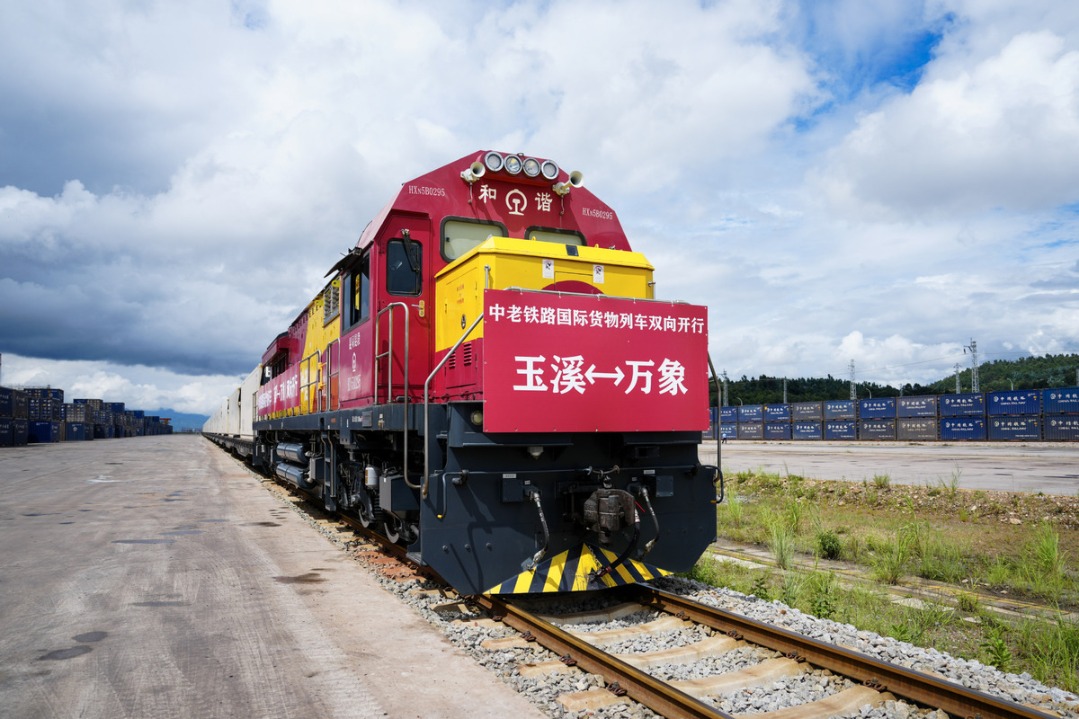New focus areas key to Africa-China trade and economic ties

The losses caused by the COVID-19 pandemic to Africa's economy are incalculable. With the epidemic still raging, the global industrial chain may be vulnerable to massive disruptions and dramatic changes.
The United States had urged its corporations overseas to relocate their businesses back to the country. European countries such as the United Kingdom and France have followed suit. This has implications for the continent of Africa as it is a fragile link in the international industrial layout.
The Africa's Purchasing Managers' Index, a gauge of manufacturing activity, fell to 45.9 in March, compared to 47.6 in the fourth quarter of 2019.
Highly dependent on the European market, North African countries including Morocco, Tunisia and Algeria have endured the pain of industrial relocations. They had been home to the white goods industry of France for decades.
At the same time, the sharp drop in most commodity prices has affected the global economy, and caused more direct damage to African countries.
The African Union expects that the annual loss of merchandise trade will exceed $270 billion in Africa this year. Monthly average crude oil prices had plunged by 50 percent between January and March year-on-year to the lowest levels in history. Africa's oil and natural gas export losses would exceed $110 billion this year.
During the same period, largely influenced by the global uncertainties, the prices of key metals and minerals fell by 8 percent year-on-year.
African countries will lose nearly $100 billion, and their tourism industry $50 billion due to suspension of flights this year. Since most of the fiscal revenue of African countries comes from exports, the governments of South Africa, Angola, Nigeria and other countries that traditionally rely on natural resources as their economic pillars, will face growing difficulties.
Fitch and other international rating agencies have lowered the sovereign credit ratings of African countries one after another. African countries' sovereign bonds are struggling to find buyers, and foreign direct investment has shrunk by a quarter so far.
The World Bank pointed out in its latest report in October that Africa will have at least 40 million more people in poverty this year, mainly young people who have difficulty finding jobs.
In this difficult time, unprecedented in history, the economic and trade cooperation between China and Africa has been severely affected. Although the total amount of goods imported by China from Africa has not dropped significantly, the lower prices of goods have led to a sharp decline in the value of trade, making the trade balance problem between China and Africa more obvious.
On the other side, both the volume and value of goods imported from China by Africa have dropped significantly. Some trade committees in China pointed out that African countries generally suffer from a shortage of foreign exchange, which has reduced imports from China.
In addition, the currencies of many African countries continue to depreciate. International traders can only take a wait-and-watch attitude.
In the field of investment, due to the suspension and isolation measures adopted by some African countries, Chinese investment companies in Africa are unable to replenish goods locally, equipment and assembly parts are scarce, and large-scale shutdowns have occurred in manufacturing.
Nevertheless, the total trade volume between China and Africa is still in a relatively reasonable fluctuation space. China's trade with Africa was only $10 billion in 2000 and reached $100 billion in 2008.
Since then, it has been Africa's largest trading partner. In 2019, they created a historical record of $206.8 billion, accounting for almost 20 percent of Africa's total foreign trade. However, China-Africa economic and trade cooperation has not always maintained sustained high-speed growth, but has risen in a curve along with the global economic situation and the respective economic development processes of the two sides.
For example, in 2015, the bilateral trade volume between China and Africa fell by 18.3 percent, mainly due to the collapse of international raw material prices.
According to data from the General Administration of Customs of China, China-Africa trade volume in the first half of this year was worth about $82.37 billion, down more than 19 percent year-on-year. Although China's import and export situation is difficult, its partner Africa has seen that its own economic losses may be much higher than the losses of foreign economic cooperation.
According to estimates by the United Nations Conference on Trade and Development, the African continent's intra-continental trade only accounts for 16.6 percent of its international trade, which is much lower than that of Asia's 59.4 percent. Therefore, Africa is unable to solve economic problems by itself, and economic difficulties caused by the epidemic will become more serious.
From a comparison, the decline in trade between China and Africa is also much better than that of other major countries. In recent years, Western powers have pursued isolationism and protectionism and reduced their investment in Africa. Their share in Africa's trade map has continued to decline.
Compared with Western countries, the Chinese government, enterprises, and social organizations have maintained their policies' strength and innovated cooperation models under difficult circumstances, ensuring the sustainable development of China-Africa economic cooperation, and becoming valuable experiences for promoting China-Africa cooperation in the future.
First, the two sides should maintain policy determination. Under the cooperation mechanism of the Forum on China-Africa Cooperation, various Chinese ministries communicated more closely with African partners at the beginning of the epidemic, learned about Africa's difficulties at the outset, and reduced or re-arranged bilateral debts.
China has repeatedly reiterated its support for Africa in new business sectors like digital economy, smart cities, clean energy, and 5G to boost Africa's development and revitalization, and pledged to accelerate the follow-ups to the Beijing Summit of the Forum on China-Africa Cooperation.
Second, cross-department cooperation is key. China's different departments, which used to lack coordination in Africa affairs due to distance in sectors, achieved breakthroughs in many aspects during the epidemic.
For example, some African governments lack foreign exchange but urgently need to purchase medical supplies from China. Sacrificing short-term benefits, Chinese enterprises that have long-term investments in Africa, used their bank credit to purchase medical supplies for the African health sector.
This not only solved the actual problems in Africa, but also allowed China's pharmaceutical enterprises, which are not familiar with Africa, to quickly expand during the pandemic in the African market, and further enhanced China's image.
Third, understand the African market. Chinese companies are the first to get out of the epidemic, resume work and production, and focus more on the people's livelihood and on goods produced and exported for Africa, thus further consolidating their market share.
At present, the focus of China-Africa economic cooperation has shifted to sophisticated industries. But traditional industries still show importance. Because the social development of Africa remains uneven, the main social groups still need high-quality and inexpensive products in terms of food, clothing and housing. China's traditional industries are still very vital.
Fourth, use new technologies. A major change in this epidemic is that we gradually get rid of dependence on individuals and seek support from new technologies. During the epidemic, many African companies had to use remote e-commerce systems, but now they have fully adapted and recognized new technologies.
The e-commerce system can complete the entire process from market research, advertising, production and supervision to online transactions, which can maximize the cost of travel and reduce business links, and is conducive to standardized management.
The writer is executive researcher of the Institute of West Asia and Africa of the Chinese Academy of Social Sciences, council member of the Chinese Society of Asian and African Studies.
The views don't necessarily reflect those of China Daily.
Today's Top News
- Book on Confucianism launched in Brussels
- Right track for China-ROK ties lauded
- Nursery rooms help fathers take part in parenting duties with more ease
- Innovation key to cultivation of growth drivers
- Spokeswoman: Separatism doomed to fail
- Recall vote result resounding failure for DPP's political manipulation efforts






























